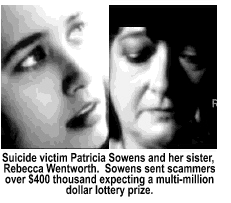
News
Behind the Headlines
Two-Cents Worth
Video of the Week
News Blurbs
Articles
Testimony
Bible Questions
Internet
Articles (2012)
Internet Articles (2011)
Internet Articles (2010)
Internet Articles
(2009)
Internet Articles (2008)
Internet Articles (2007)
Internet Articles (2006)
Internet Articles (2005)
Internet Articles (2004)
Internet Articles (2003)
Internet Articles (2002)
Internet Articles (2001)

You just won a cazillion bucks.
Every day when I check the mail in my cybermailbox I discover that I just won a cazillion bucks—or my non-existent eBay account or PayPal account has been suspended. Or someone tried to make a purchase with my Chase Manhattan or Wells Fargo MasterCard or Visa card. Since I don't have any of those, I know the emails are sent by con men—most likely sitting at computers in Russia, China, Pakistan, Somolia. Nigeria, Israel or Palestine.
What amazes me most is that my email provider does not have a system for reporting con men to them, or an ISP-provided email address to forward attempts to defraud American citizens (complete with all routing information) to the FBI or someone else who can do something more than commiserate with me when I lose my shirt. I get the feeling sometimes that the view in Washington, DC must be that the bureaucrats believe that anyone dumb enough to think they could win a European Union lottery they never entered deserves to be taken.

Not all of the Internet scams are designed to steal your hard-earned cash. Some are aimed at stealing your complete identity so that, armed with your correct name, social security number, and credit card number or bank account number, the identity thief can steal all of your liquid assets, or quadruple your debt as they go on a buying binge in your name—and with your credit cards or checking account..
One e.letter—containing a Citi™ logo (from payments@webmail.com) serves to notify unsuspecting Citibank users that their account has been suspended. However, if the email had come from CitiBank, the email address would have been from @citibank.com. The letter—which does not reference the account holder's name or Citibank account number (which tells you the letter is a fraud), begins:
Dear customer:
Online Banking Access SuspendedThis is to inform you that your access to our online banking service has been suspended. This was a result of several multiple sign-in attempts, recently recorded in our security logs. Please restore your online banking access by clicking on the link below. Once you have entered your correct sign-on information, your online access will be reactivated. Click here to reactive your online access.
Richard Searle
Head Online Security Team
Citi BankThis private and confidential e-mail has been sent to you by Citi Bank plc (reg. no. 106048). Citi Bank, Citi Bank Limited, Citi Bank Life Marketing Group and Citi Bank Unit Trust Managers Limited represent only the Citi Marketing Group, who is authorised and regulated by the Financial Services Authority for life assurance, pensions, unit trusts, insurance and regulated mortgages.
Note the word "authorised" in the small print paragraph. The US spelling of the word is "authorized." Clearly, if you don't have an account with CitiBank, you know the email is an attempt to scam you. You throw it away without a second thought. However, if you have a CitiBank account, without thinking, you may click on the link and go to the fake website—and give identity thieves all of the information they need to steal your identity—and your money. And, steal them they will.
The scam letter from identity thieves claiming to be officials from Bank Of America are even more realistic because the web address they ask you to go to appears to be http://www.bankofamerica.com. However, when you click on the hyperlink in the email, it diverts you to another address that is not Bank of America. And, once again, the data you provide to reactive your account—that has never been inactivated—will be in the hands of an identity thief who will drain every readily available cent you possess within a matter of minutes. Usually at that point, they will sell your personal information to a dozen or more identity thieves who will then sell your identity to illegal aliens or to identity thieves who traffic in using other people's identities to shop online. The Bank of America letter says:
Welcome Member of Bank of America
Due to concerns regarding your recent activities involving your account and the for safety and integrity of the online banking community, we have issued this warning message:It has come to our attention that your account information needs to be updated due to inactive member status, frauds and/or spoof reports. We will appreciate if you could spend several minutes out of your online experience and renew your records to prevent your account running into future problems or even failure with the online service. However, failure to update your records will result in temporary/permanent account suspension. This notification expires Nov. 4, 2007.
Once you have updated your Internet banking service will not be interrupted and will continue as normal.
Just follow the link below
and renew your account information
http://www.bankofamerica.com
(pictured, Bank of America™ logo)
As noted above, if you received that email and clicked on what looks like Bank of America's address, you would be diverted to another address—like this..(to return to this article, please hit the "return" button after clicking on this hyperlink: .http://www.bankofamerica.com.) What appears to be one thing on the surface, may be something else completely. The Internet has always been a "buyer beware" media. The correct URL for Bank of America is https://www.bankofamerica.com even though you can access it by http://www.bankofamerica.com.
The idea with all identity thieves is to have the targeted user of one of the services they include in their arsenal to give them the critical information they need to access their bank accounts, credit cards, or merchant account at PayPal or eBay. Even if the web address appears in the email to be the correct PayPal or eBay URL, you can bet your email will be diverted to a clone website that appears to be the real McCoy although it will be a clone site.
People love getting emails telling them they have overpaid something. Refunds are good—its the American way. But, when you are doing business with companies in the United States, you have to go to them to collect earned refunds—or, you simply get a check in the mail. The following scam letter promises the recipient that they will send that check after the recipient completes a tax refund request form. This is just one more clever way to collect that critical information that will allow the scammer to steal your identity. (Tax refunds, by the way, come from the State or federal government and never from a credit union.)
Dear Customer
Your Debit Card must receive a refund worth 288.40$USD from Co-op Services Credit Union. After the last annual calculations of your account activity we have determined that you are eligible to receive a tax refund of $288.44 credit.
Please submit a tax refund request and allow us 6-9 days in order to process it. To get your Tax Refund Money please click the link below:
https://csus.cyberbranch.com/HB/GetLoginScreen.event?track=CACU969060F01F909Regards
Co-op Services Credit Union
Customer Service
It's shocking how many people fall for the most ridiculous scam in cyberspace—the lottery windfall. I don't know anyone who hasn't heard the adage: before you can win the lottery you have to buy a ticket. What does that mean? What it doesn't mean is that if you buy a lottery ticket you will win. Quite simply, what it's telling you is that if you don't buy a lottery ticket you can't win.
Lotteries are games of chance—phenomenal chance. It's a hundred-million-to-one long shot. But you still have to buy a ticket to win. You can't win a lottery here, or anywhere in the world, if you don't buy a ticket. And, I hate to burst your bubble on this one, but there is no email lottery with Bill Gates or some other cyber-billionaire kicking in the prize money to reward people for using their email service. I guess the most surprising thing is the amount of people who think someone has entered them in a free lottery—when most of them won't go to a neighborhood 7-Eleven and invest a buck in the Powerball or Super Lotto.
And, like the bank information scam, there are as many variations of lottery scams as there are lottery scammers. Throwing in a new BMW doesn't make it more credible. This scam email begins:
The National Lottery
in conjunction with
BMW AutomobilesCongratulations!!!
You have won £500,000.00 in the email raffle draw yearly sweepstakes program. For further development and clearification procedure please contact the personnel with information below. (Letters from official lottery officials can spell "clarification" correctly.)
Contact Mr. Peter Moore
E-mail: petermoore22@sify.com
Telephone - +44-7045724973
Claims Processing Manager
When you respond to the email address, you will be told you have to prepay the taxes—or some other fees—on your winnings. But the "lottery commission," you will be told, will be willing to advance you some of your prize money by certified check—deducted from your winning—to pay those costs. Your check will confirm that you—and not some third party—prepaid the taxes (or the lottery filing fees or whatever nonsense fee they concocted to extort money from you). Of course, their "certified check" will bounce since its as phony as the third Tuesday of the week.
Another scammer, using Google's name, claims to represent the Google International Lottery which, of course, does not exist. This one claims to be tied to your email, and winning emails are drawn at random. This one uses a gimmick to play on your greed to keep the fact that you have been defrauded quiet out of fear that you will lose the €1,000,000 (Euros).
Google Email Lottery International
World Internet Lotto Centre
Eastern Ave 6528
International Promotion/Prize Award Dept.
Promoting Internet Usage Over the Globe
(We encourage globalization)Dear Lucky Winner:
Consolidation Prize: WINNING NOTICE!!!
Congratulations to you as we bring to your notice, the results of the First Category draws of E-MAIL LOTTERY organised by GOOGLE INTERNATIONAL. We are happy to inform you that you have emerged a winner under the First Category, which is part of our promotional draws. The draws were held on 17th October 2007 and results are being officially announced on 2nd of November 2007. Participants were selected through a computer ballot system drawn from 2,500,000 email addresses of individuals and companies in Africa, America, Asia, Australia, Europe Middle East and Oceania as part of our International Promotions Program. Your email address, attached to ticket number 675432890044/376, with serial number 200-373 drew the lucky numbers 1-0-11-44-3-222 and consequently won in the First Category. You have therefore been awarded a lump sum pay off of One Million Euro (€1,000,000) which is the winning payout for Category A winners.Your fund is now deposited with the paying bank. In your best interest to avoid a mix-up of numbers and names of any kind, we request that you keep the entire details of your award strictly from public notice until the process of transferring your claims have been completed, and your funds remitted to your account. This is part of our security protocol to avoid double claiming or unscrupulous acts by participants/nonparticipants of this program. Please contact your claims agent immediately for due processing and remittance of your prize money to a designated account of your choice. To file your claim, kindly contact your CLAIMS Agent.
Mrs. Katirinina Papadopulos
Marginlatrust Claims Agency
Tel. 0030-694-409-5741
E-mail: marginlatrust@aim.com
While I received several megabytes of this garbage today, this should be enough to show you what you're missing if you haven't received any of them. What continues to amaze me is that people are actually taken in by this dribble. Even more are the letters from African scam artists who claim to be deposed leader (or the wife of the deposed and/or assassinated leader) of this African nation or that one. These scam artists have picked you out out of 100 million cyberidiots to share their wealth with. But, they are only selecting you because they need to have someone on "the outside" to send their money. Once again, our greed snags us. And, instead of using our brains, we let greed overrule logic and convince ourselves that, at random, these rich people picked us to help them—and share their vast fortunes of stolen loot.
Computers should come with warning labels. People who are too stupid to keep from sharing critical information about their financial assets should not be allowed to own them. Here are a handful of real cybervictims and their stories. Let their bad experiences help you avoid the identity thieves and the confidence men.
 Jill
Parker and her husband decided to convert their upstairs into an
apartment. They ran an ad on one of the Internet classified websites
and received an answer from a man in Nigeria who said he worked for
a corporation in England. The man said he was being transferred to Chicago.
The first and last month's rent was $3,000.00. The scammer told Parker
he had just received a $25,000 expense reimbursement check from his
company and asked if he could send it. He said when the check cleared,
they could send him a wire transfer for $22,000 and use $3,000 of the
money for the first and last month rent. The Parkers agreed.
Jill
Parker and her husband decided to convert their upstairs into an
apartment. They ran an ad on one of the Internet classified websites
and received an answer from a man in Nigeria who said he worked for
a corporation in England. The man said he was being transferred to Chicago.
The first and last month's rent was $3,000.00. The scammer told Parker
he had just received a $25,000 expense reimbursement check from his
company and asked if he could send it. He said when the check cleared,
they could send him a wire transfer for $22,000 and use $3,000 of the
money for the first and last month rent. The Parkers agreed.
Their bank
honored the check because Jill Parker's husband had his company
account there, and usually carried a balance sufficient to cover the
check. The Parkers wire-transferred $22,000 their new "tenant"
who was planning, he said, to use the money to ship his belongings from
Nigeria to Chicago.  A
few days before Christmas the Nigerian check bounced and the bank took
deducted $25,000.00 from the Parker account. The Parkers
were scammed out of $22,000 a few days before Christmas that year. Happy
holidays.
A
few days before Christmas the Nigerian check bounced and the bank took
deducted $25,000.00 from the Parker account. The Parkers
were scammed out of $22,000 a few days before Christmas that year. Happy
holidays.
Rebecca
Woodworth's sister, Patrica Sowens, received an email stating
she had won a European Lottery. Before Sowens killed herself,
she drained her checking and savings accounts to pay the fees and taxes.
Woodworth said Sowens sent the scam artists over $400
thousand in anticipation of receiving a multimillion dollar prize. Two
days before her suicide, Sowens apparently learned she had been
scammed. In her suicide note, Sowens, a writer-artist and a Tulane
graduate, left a note to her sister, saying good-bye.  In
the note, she said "...I fell for a 419 lottery investment scam.
All of the second guessing ignores the horror of my actual state of
mind, the fear and panic, dullness and confusion. I can't ignore the
shame and guilt. This is not going well..."
In
the note, she said "...I fell for a 419 lottery investment scam.
All of the second guessing ignores the horror of my actual state of
mind, the fear and panic, dullness and confusion. I can't ignore the
shame and guilt. This is not going well..."
Julia Melton felt like the dummy of the year whem she got ripped off. In her case, she received a letter in the mail telling her she had won a Canadian Sweepstakes for $165 thousand. The "sweepstakes official" told Melton she would receive a check to cover all of the fees that needed to be paid by the recipient before the lottery officials would release the $165 thousand prize to her.
When she received
the check, the sweepstakes officials were on the phone with her the
same day, informing her that the $3,000 she owed in fees had to be mailed
to the sweepstakes officials within 48-hours for them to release her
prize money.  Melton
said she realizes now that the reason the "official" was so
insistent is because he knew that within a matter of a few days at the
most, the check he sent to cover the wire transfer would bounce, and
if she had not wire-transferred the money before that happened, he would
never get it.
Melton
said she realizes now that the reason the "official" was so
insistent is because he knew that within a matter of a few days at the
most, the check he sent to cover the wire transfer would bounce, and
if she had not wire-transferred the money before that happened, he would
never get it.
Susan Jones thought she found true love on the Internet. Her true love, she thought, (from the photos he sent) was a good looking guy named Kenneth Cole who claimed he was building a shopping mall in Nigeria. When he found her, he sent her 12 dozen red roses. A short time later he sent her an Easter basket with a note professing his undying love Heartwarming. He was genuinely warm and sweet, she thought. Then one day she received a packet of money orders he wanted her to deposit in her account.
After she got the money orders she then received, over the Internet, a list of "the suppliers" Cole wanted US checks sent to. (The money orders came from a company called Allen Constructions. Jones was very surprised to get the bundle of money orders and wondered why he didn't have an accountant in Nigeria write checks to his suppliers. She deposited the money orders and wrote the checks. When the money orders started to bounce, Jones went to her bank where she learned the money orders were all counterfeit
Linda Kelly,
who has her own business—an offshore website auction business—had
a customer in an African nation who wanted to buy a $100 table from
her website and have her ship it to him. She suggested that it would
cost more to ship the table than it was worth. He agreed to pay whatever
costs were needed to ship the table.  She
used PayPal, she said. He needed to go online and buy the table. He
told her that he didn't trust PayPal and that he had a cashier's check
in the amount of $3,500.00 that he would send instead. She could cash
it, take whatever money was required to pay for the table—and money
to cover her time—and wire-transfer the balance of the money to
him.
She
used PayPal, she said. He needed to go online and buy the table. He
told her that he didn't trust PayPal and that he had a cashier's check
in the amount of $3,500.00 that he would send instead. She could cash
it, take whatever money was required to pay for the table—and money
to cover her time—and wire-transfer the balance of the money to
him.
Accustomed to sending and receiving certified checks, Kelly didn't see a problem. She would take the check to her bank, cash it, ship the table and send her customer his "change." She told him to send the check. When she received it, she took it to her local bank. They said since it was drawn on a foreign bank, the check would have to go through the clearing houses. They told her she would have to deposit the check and, by morning, she could access the funds. Kelly deposited the check, and proceeded to forget about it for four days. On the fourth day she received an angry email from the "customer," who asked why she hadn't sent him his money. Rattled, she dashed to the company she used to make wire transfers, and sent him his funds. Then she headed to her bank, a little farther down the road, and attempted to access funds from her account through her debit card.
Kelly was shocked to discover that she could not access her money with her debit card. The bank told her that there was a "problem" with the certified check she had deposited in her account. It was not going to clear the bank. Kelly realized immediately that she had been scammed. She dashed back to the company where she did the wire transfer only to learn that just about a minute before she walked back into the building, her wire transfer went through. Linda Kelly was out about $3,200.00.
Shannon
Callahan was having a hard time financially because her mother was
suffering from a terminal illness, and she was told, her mother would
die within six months. Because her mother required 24-hour care, Callahan
took a leave of absence to care for her mother. A month or so before
her mother died,  Callahan
received an email from someone overseas who told Callahan she
was an artist who sold her paintings to clients in the United States.
The clients, she said, paid her with money orders which she had trouble
cashing because they were American money orders. She told Callahan
she needed to be paid by wire transfer. Why it never dawned on Callahan
to inquire why it was she wasn't asking her US customers to send wire
transfers instead of mailing money orders can probably be blamed on
her mother's terminal condition—and Callahan's panic mode
need to bring some income into the household. Had she thought about
it, Callahan should have seen the con. She didn't because the
woman offered to pay her an override to cash her checks and wire transfer
the funds to her.
Callahan
received an email from someone overseas who told Callahan she
was an artist who sold her paintings to clients in the United States.
The clients, she said, paid her with money orders which she had trouble
cashing because they were American money orders. She told Callahan
she needed to be paid by wire transfer. Why it never dawned on Callahan
to inquire why it was she wasn't asking her US customers to send wire
transfers instead of mailing money orders can probably be blamed on
her mother's terminal condition—and Callahan's panic mode
need to bring some income into the household. Had she thought about
it, Callahan should have seen the con. She didn't because the
woman offered to pay her an override to cash her checks and wire transfer
the funds to her.
Tragically, her mother died at about the same time the money orders started bouncing. Her mother was gone, and so was her life. Her sister—who also suffered the loss of her mother—had to bail Callahan out of trouble. It is unclear how much money Callahan lost since the total loss had to be calculated not only on the amount she wire-transferred to the scam artist, but the amount of "commission" she had written checks against—and the check charges from her bank and those local businesses where Callahan purchased those things she needed for her home.
As I said earlier, there are as many scams as there are con artists using them to trick US consumers—who are viewed by con artists in the third world as the most gullible people—into parting with their hard-earned money. Most of those who are scammed stopped believing in Santa Claus and the tooth fairy decades ago. But, almost weekly, they read in the newspaper or see on TV that someone just won anywhere from $15 to $350 million in the Power Ball Lottery or Super Lotto. So, why not them?
Many of the scams come from foreign countries. The con men pretend to be businesspeople or government officials—or recently deposed officials trying to get their ill-gotten gains out of the country. The crux of every scam, regardless of the suit of clothes the scam wears is to get you to cash a check or money order and wire transfer those funds back to them. The reasons they can't cash the checks are as varied as the schemes themselves. One variable remains constant in every scenario—if you cash their check and wire transfer them money, you are going to lose whatever you send.
The con artists are generally pretty good. After all, that is how they "earn" their living. Sometimes they target their victims through organizations or churches by developing sales pitches aimed that a particular demographics. That way, its easier for the con artist to play on your emotions. But the best scam is still the lottery or sweepstakes Most people fall for it because they fail to realize that its illegal for foreign lotteries or sweepstakes to sell tickets in the United States—even though it doesn't seem to dawn on those who win that they never bought a ticket. That's why the email lottery is the best scam—particularly since everyone thinks the Internet financial gurus all have enough loose change laying around to sponsor multimillion dollar giveaways to attract users.
Because the potential for a big score exists with the cyberidiots who will accept the fact that they just won a nonexistent email sweepstakes they never entered, more con artists use those types of scams. Scammers in Canada and Mexico send their notices by regular mail, by phone or email. But, the one element that remains constant is that they are going to have you send them a wire transfer.
Why a wire transfer and not a check? Because once a wire transfer is sent, it can't be canceled and it can't be recalled. Just as Linda Kelly learned one minute after her wire transfer was sent, it can't be canceled. You can't call and put a hold on the money because its already in someone else's account somewhere else in the world.
If you believe you have been approached by an Internet con-man—or one who has made the serious blunder of using the US Mail, you need to contact the National Consumers League's Fraud Center. Use the online form they provide to report suspected fraud. You can find the form at https://secure.nclforms.org/nficweb/nfic.htm. Use this form for either telemarketing fraud or Internet fraud. If you receive these types of offers through the mail, contact your local USPS office and ask for a US Postal Inspector.
Well, once again, you have my two cents worth on this subject.



Copyright © 2009 Jon Christian Ryter.
All rights reserved.


